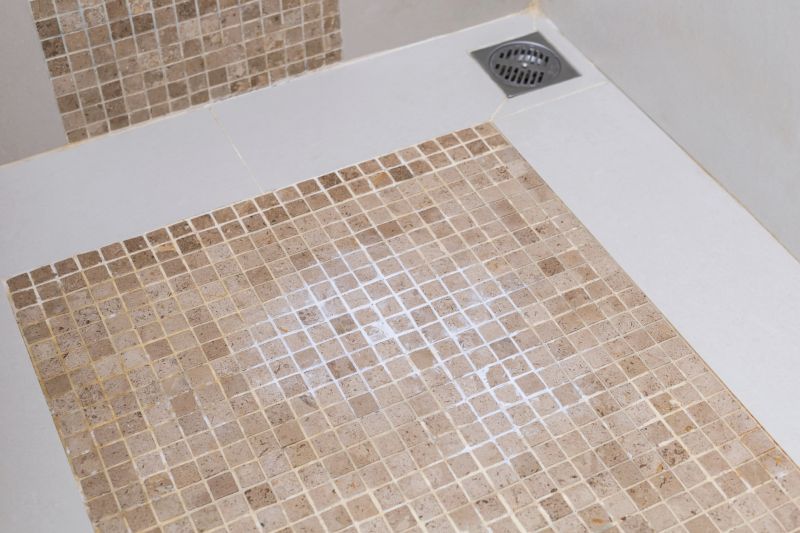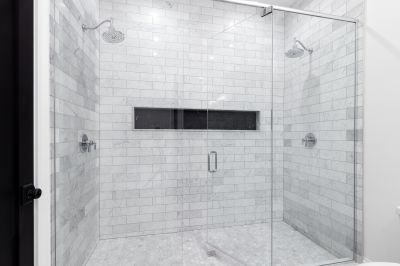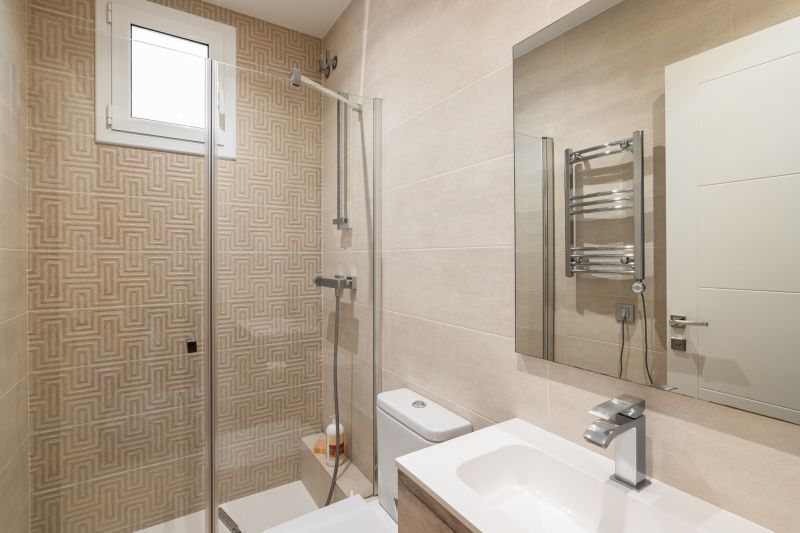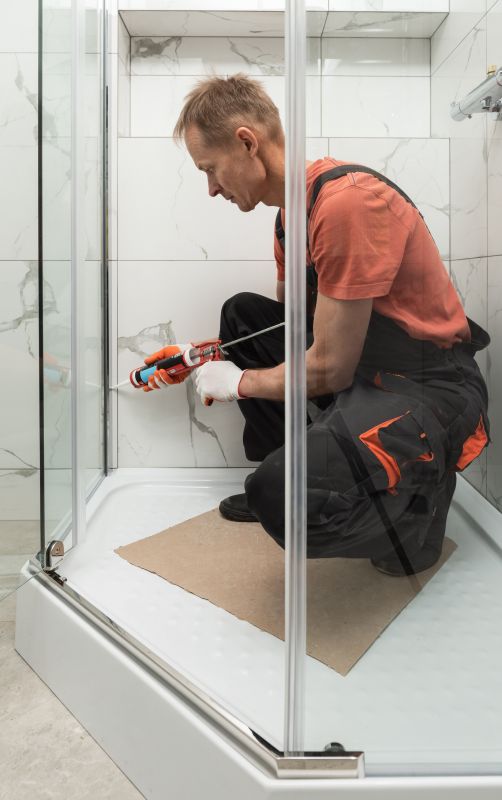Shower Floor Upgrade
Welcome to Aberdeen Showers
Shower Floor Upgrade

About Shower Floor Upgrade
Upgrading your shower floor can transform the aesthetic and functionality of your bathroom, offering both style and practicality. Whether you're looking to enhance the visual appeal or improve the safety features of your bathroom, a shower floor upgrade is a significant consideration for homeowners. With numerous options available, understanding the key factors can help in making informed decisions.
When planning a shower floor upgrade, material selection is one of the primary considerations. Common materials include ceramic, porcelain, natural stone, and acrylic. Each material offers distinct advantages, such as durability, ease of maintenance, and aesthetic appeal. For instance, ceramic and porcelain tiles are popular for their water resistance and variety of styles, while natural stone provides a unique and luxurious look.
The size and shape of tiles are also important factors. Smaller tiles, such as mosaics, can offer better traction due to the increased number of grout lines, which can be beneficial for slip resistance. Larger tiles, on the other hand, can create a more seamless and modern appearance but may require additional considerations for drainage and slope.
Drainage is a critical aspect of any shower floor upgrade. Ensuring proper slope and water flow towards the drain can prevent water pooling and potential damage. Linear drains have become increasingly popular, providing a sleek look and efficient water management. It is essential to consider the placement and type of drain that will best suit your shower design.
Color and texture choices can significantly impact the overall ambiance of your bathroom. Light colors can make a space feel larger and more open, while darker tones might add a touch of elegance and warmth. Textured surfaces can enhance slip resistance, which is particularly important in a wet environment.
Maintenance requirements should not be overlooked when selecting materials and finishes for your shower floor. Some materials may require regular sealing to maintain their appearance and functionality, while others are virtually maintenance-free. Understanding the care needs of each option can help in making a sustainable choice.
Here are some common options to consider when upgrading your shower floor:
- Ceramic tiles for a classic, versatile look.
- Porcelain tiles for enhanced durability and water resistance.
- Natural stone for a luxurious and unique appearance.
- Acrylic bases for a seamless and easy-to-clean solution.
Additionally, the installation process and time frame are important considerations. Each material and design choice may have different installation requirements that could affect the project timeline. Proper planning and understanding of these factors can help ensure a smooth upgrade process.
Finally, integrating your shower floor upgrade with the overall design of your bathroom is crucial for achieving a cohesive and harmonious look. Coordinating with existing elements such as wall tiles, fixtures, and color schemes can create a balanced and aesthetically pleasing environment.

Choosing the Right Materials for Your Shower Floor Upgrade
Explore the Best Options for Durability and Style
Upgrading your shower floor can significantly enhance both the functionality and aesthetic appeal of your bathroom. With a variety of materials available, selecting the right one can be a crucial decision that affects the longevity and style of your shower. Each material comes with its own set of characteristics, benefits, and considerations, making it essential to understand the options available.
Ceramic and porcelain tiles are popular choices for shower floors due to their water resistance and wide range of design options. These materials are known for their durability and ease of maintenance. They can mimic the appearance of natural stone or wood, providing a luxurious look without the associated upkeep. However, it's important to choose tiles with a textured surface to prevent slipping when they get wet.
Natural stone, such as marble, granite, or travertine, offers a timeless and elegant appearance. These materials can add a touch of luxury to any bathroom. While natural stone is undeniably beautiful, it requires sealing to protect against moisture and stains. Additionally, it can be more challenging to maintain, as certain cleaning products can damage the surface over time.
For those seeking a modern and seamless look, consider using glass tiles. Glass tiles are available in a multitude of colors and finishes, allowing for creative and unique designs. They reflect light beautifully, making the shower space appear larger and brighter. Despite their aesthetic appeal, glass tiles can be slippery when wet, so they may not be the ideal choice for everyone.
Another option is pebble tiles, which bring a natural and spa-like feel to your shower. These tiles consist of small, smooth stones that are often set in a mesh backing. Pebble tiles provide excellent traction due to their textured surface and are visually striking. However, they may require more grout maintenance to prevent mold and mildew growth.
When selecting materials for your shower floor upgrade, consider factors such as slip resistance, ease of maintenance, and aesthetic preferences. It's also important to think about how the material will complement the rest of your bathroom design. By carefully weighing these aspects, you can choose a material that not only enhances the beauty of your shower but also meets your practical needs.
- Ceramic and Porcelain Tiles
- Natural Stone
- Glass Tiles
- Pebble Tiles
Ultimately, the right material for your shower floor upgrade will align with your personal style and functional requirements. By exploring the various options and considering their unique properties, you can transform your shower into a stunning and practical space that enhances your daily routine.

DIY vs. Professional Installation: What's Best for Your Shower Floor Upgrade?
Weighing the Pros and Cons of Installation Methods
Upgrading a shower floor can significantly enhance the aesthetics and functionality of a bathroom. Homeowners often find themselves at a crossroads when deciding between handling the project themselves or hiring a professional installer. Each option comes with its own set of advantages and challenges, making it essential to evaluate them carefully before making a decision.
One of the primary considerations for those contemplating a self-managed installation is the potential for cost savings. By undertaking the project independently, homeowners can allocate more of their budget towards high-quality materials. However, this approach requires a certain level of skill and familiarity with the tools and processes involved in shower floor installation. Mistakes made during the installation could lead to additional expenses down the line.
On the other hand, hiring a professional installer offers peace of mind and convenience. Professionals typically have extensive experience and can ensure that the job is completed efficiently and to a high standard. This option can be particularly appealing for those with limited time or for complex projects that might be beyond the scope of an average homeowner's abilities.
When choosing between these options, it is important to consider the scope and complexity of the project. Simple tile replacements might be manageable for someone with basic home improvement skills, while more intricate designs or materials could necessitate professional expertise. Additionally, the condition of the existing shower floor should be assessed, as underlying issues such as water damage or uneven surfaces might require more advanced solutions.
Another factor to consider is the timeline for the project. Professional installations are often completed more quickly due to the installer’s experience and access to necessary resources. For homeowners who prefer to minimize disruption to their daily routine, this can be a significant advantage. Conversely, those who enjoy home improvement projects and have the flexibility to work at their own pace might find personal satisfaction in tackling the project themselves.
- Evaluate the complexity of the project
- Consider your skill level and available time
- Assess the condition of the existing shower floor
- Determine your budget for materials and labor
- Think about the timeline for completion
Ultimately, the decision between a self-managed installation and hiring a professional comes down to personal preference, budget, and the specifics of the project. Both options have the potential to yield a beautiful, functional shower floor that enhances the overall bathroom experience. By carefully weighing the pros and cons of each approach, homeowners can make an informed choice that aligns with their goals and resources.




